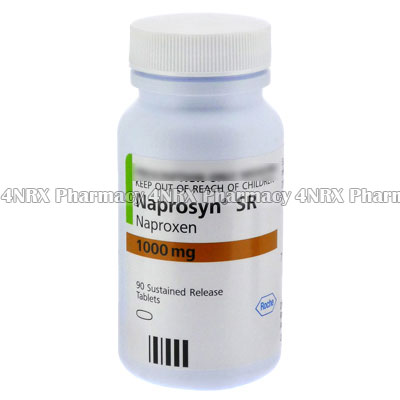 |
Home  Arthritis Arthritis  Naprosyn SR (Naproxen) Naprosyn SR (Naproxen) |
|
|||||||||
|
|
Naprosyn SR (Naproxen)
What is Naprosyn SR (Naproxen) used for? Naprosyn SR (Naproxen) is a type of medication known as a non-steroidal anti-inflammatory drug (NSAID) prescribed to treat patients suffering from osteoarthritis, rheumatoid arthritis, or ankylosing spondylitis. The medication operates by preventing the action of enzymes released in response to injury that cause the swelling, irritation, and pain associated with these conditions. This allows easier and more comfortable movement of affected joints. The medication may also be used to treat intense pain during menstruation (dysmenorrhea) or pain caused by injuries such as sprains or strains. Your physician may prescribe it to treat other unlisted conditions, as well. How should I use Naprosyn SR (Naproxen)? Naprosyn SR (Naproxen) is typically taken two to three times each day at a dosage of one tablet, but your individual instructions will depend on the condition being treated and the severity of your symptoms. These should be swallowed with a full glass of water and may be taken on an empty stomach, but a meal is recommended before use if you experience nausea. Avoid crushing, splitting, or chewing the tablets before use as this may destroy or alter the effects of their contents. Ask your pharmacist or physician any questions you have about the medicine to ensure the correct administration. What are the side effects of Naprosyn SR (Naproxen)? The use of Naprosyn SR (Naproxen) may cause side effects in some patients such as:
Inform your physician immediately about any symptoms that worry you or if more serious side effects appear including trouble breathing, chest pain, fatigue, tingling sensations, urinary retention, seizures, severe skin reactions, coughing up blood, darkened urine, or jaundice. These conditions may require immediate medical attention or adjustments to your dosage to prevent further complications. Please Note Do not begin using Naprosyn SR (Naproxen) if you have severe heart failure, active intestinal bleeding, an ulcer, or if you have had a bad reaction to aspirin or other NSAID medications. Also inform your physician about other conditions you have that may cause complications during treatment such as if you are a smoker or have a history of allergies, diabetes, heart failure, inflammatory bowel disease, a history of intestinal disorders, hypertension, cerebrovascular disease, poor circulation, high cholesterol, decreased liver function, decreased kidney function, or if you are taking anticoagulant medications. These may require reduced dosages or other changes to your regimen to prevent potential health problems from occurring. Strictly follow all instructions provided to you by your physician or pharmacist while using Naprosyn SR (Naproxen). Optimum and safe dosage can differ based on the patient and the condition being treated. As this medication may be unsafe for certain patients, it is essential you always inform your physician if you are pregnant or breastfeeding, as well as if you have any allergies, other illnesses, or ongoing health conditions, and if you are taking any other form of medication, supplements, or herbal products. Immediately seek emergency medical care if you have an allergic or hypersensitive reaction. Common signs of a reaction include hives, swelling, skin rashes, chest pains, as well as trouble breathing or swallowing. 
|
||||||||||||||||||||||